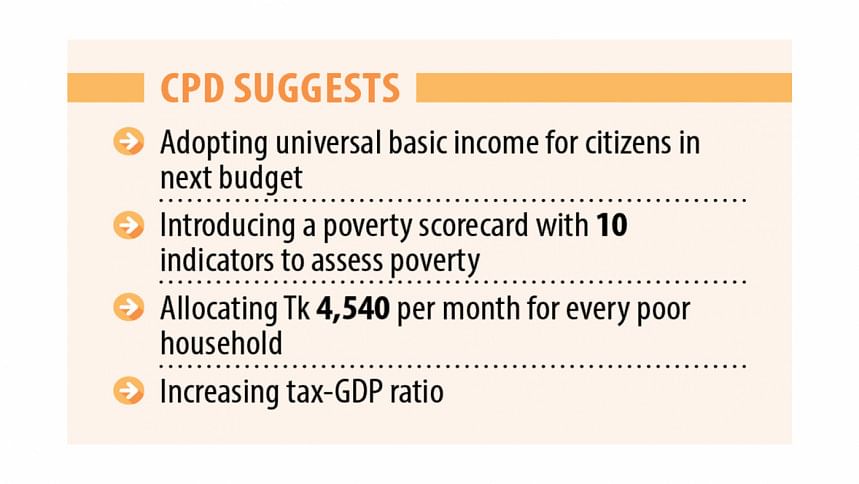Targeted cash transfers can cut poverty by a third: CPD

Targeted cash transfers to poor households could reduce Bangladesh's poverty rate by 6.13 percentage points, according to the Centre for Policy Dialogue (CPD), as the think-tank argued that current social safety net programmes are plagued by inefficiencies such as errors in beneficiary selection.
At a dialogue in Dhaka yesterday, the CPD proposed providing Tk 4,500 per month to targeted households based on their level of income.
The CPD said households could be identified using a poverty scorecard and intervention approaches could be tailored to poverty-prone, climate-vulnerable and highly poverty-prone areas.
The think tank contended that current social safety net programmes, despite costing crores in taxpayer money, are insufficient and inefficient in addressing poverty.
According to the National Household Income and Expenditure Survey (HIES) 2022, the poverty rate in Bangladesh was 18.7 percent, while the extreme poverty rate stood at 5.6 percent.
Despite more than 140 ongoing poverty alleviation programmes, the think tank said the beneficiary selection process does not have objective metrics, meaning officials can exercise excessive discretionary power, which ultimately leads to prejudice and nepotism.
"Besides, most of these programmes are rural-centric, which is ineffective in reducing overall poverty," said Towfiqul Islam Khan, a senior research fellow at the CPD.
While presenting the keynote at the dialogue, titled "Assessing the Viability of Universal Basic Income (UBI) in Bangladesh" at Hotel Lakeshore in Gulshan, Khan said that the government should select its approach based on the country's limited revenue mobilisation capacity.
Professor Rehman Sobhan, chairman of the CPD, Amir Khasru Mahmud Chowdhury, former commerce minister, and KAS Murshid, head of the interim government's sustainable development review task force, also spoke at the event.
Targeted cash transfers to cost up to 1.35% of GDP
The CPD estimated that a nationwide cash grant programme could cost the government 1.35 percent of the country's gross domestic product (GDP).
"The second approach, providing targeted cash grants to poverty-prone households, would cost around 0.84 percent of the GDP. Programmes for climate-vulnerable and highly poverty-prone areas would cost 0.67 percent and 0.27 percent of GDP, respectively," Khan said.
"The people of Bangladesh have a right to a minimum income as citizens. While there may be challenges, this is the government's responsibility, not the people's," said Debapriya Bhattacharya, a distinguished fellow at the CPD who also moderated the event.
In his speech, Professor Rehman Sobhan said the Universal Basic Income (UBI) could be a serious policy option for Bangladesh.
He said that the UBI concept has been discussed globally since the 1980s, originating from an International Labour Organization official.
Sobhan appreciated the CPD for producing a comprehensive paper, saying that it has moved beyond academic discussion and now holds the possibility for a real-world impact.
"This is no longer an academic paper... it has the possibility of being taken seriously," Prof Sobhan said, calling to include the UBI in the upcoming national budget.
The renowned economist also cautioned against potential implementation issues, especially the risk of UBI being used as a tool for political patronage.
"Every single government in my living memory has used cash transfer programmes as an instrument of patronage," he said.
Social safety net needs overhaul
Taskforce head Murshid said Bangladesh has around 120 social protection programmes.
"Bringing them under a single umbrella would improve their effectiveness. Now is the opportune moment to consider this approach," he said.
He elaborated on the inconsistency in defining poverty and the poor, saying that targeting errors, omissions and inclusions continue to dent progress.
"We haven't overcome these issues. In fact, our performance has deteriorated over the years."
Besides, Murshid mentioned that social protection programmes remain largely focused on rural areas despite the shift towards urbanisation, with nearly 40 percent of the population now residing in urban areas.
Given the current economic slowdown, Murshid emphasised the importance of expanding the safety net to include those just above the poverty line who are at risk of slipping into poverty.
Identifying vulnerable populations is important to prevent further deterioration, he added.
Former commerce minister Khasru said the mindset of people in Bangladesh has undergone a significant shift since the deposal of the "autocratic regime".
"The way people's attitudes, expectations and values have changed aligns with today's presentation," he said, warning that political leaders who fail to recognise this change have no future.
He stressed the need for Bangladesh to become an egalitarian society, identifying over-exploitation, wealth concentration and corruption as major issues draining the economy and depriving people of their share.
Advocating good governance and efficient delivery systems, especially at the local government level, Khasru discussed the need for sustainable programmes, noting that a basic income or wage alone is not a viable solution.
Prof Mustafizur Rahman, a distinguished fellow of the CPD, called for public-private partnerships to address economic challenges, stressing the importance of viewing the issue from an anti-oppression perspective.
"Nothing is as strong as an idea whose time has come," he said.
"Everyone should have a minimum income... this is not about means-testing," he said.
Mostafa Kamal, additional secretary of the social welfare ministry, said social safety net programmes were not as successful as expected due to flaws in planning and weaknesses in implementation.
"These issues have to be looked into before any new programmes are launched," he added.
Rizwan Rahman, former president of Dhaka Chamber of Commerce and Industry, said he had seen news of 300 people receiving incentive assistance from the same mobile number during the Covid-19 pandemic.
"This should not happen under new programmes."
He also suggested ensuring that social security allowances do not go above the minimum wage. "Otherwise, the tendency to remain unemployed may increase."
Imran Matin, executive director of the BRAC Institute of Governance and Development, said transparency and accountability are key to the success of any government programme and must be ensured.

 For all latest news, follow The Daily Star's Google News channel.
For all latest news, follow The Daily Star's Google News channel. 



Comments